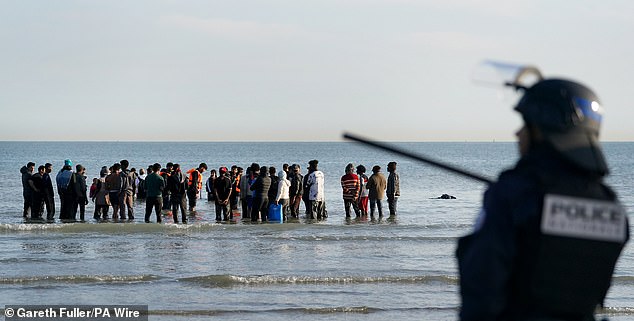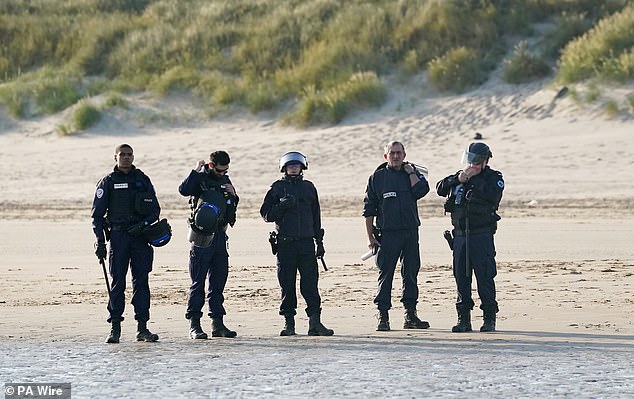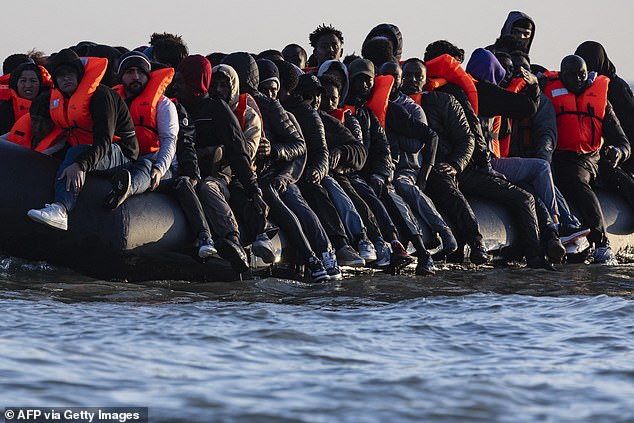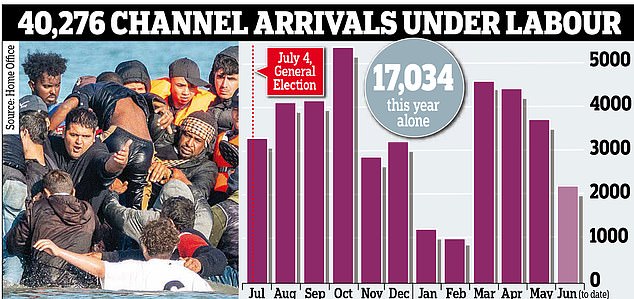French authorities have finally promised to intercept small boats in Channel waters as figures reveal a migrant reached Britain every four-and-a-half minutes last week.
A new ‘maritime doctrine’ set to come into operation next month allows French police officers to block dinghy departures within 300 yards of the shoreline.
Currently, they are barred from intercepting any boat once it is in the water.
But gendarmes have expressed concerns over their safety when the new policy comes into force.
The new rules will be introduced after Channel migrants reaching the UK topped 2,000 in a week for the first time in 21 months, following 489 arrivals on Tuesday.
The 2,222 arrivals over seven days meant an average of one migrant reached Britain every four-and-a-half minutes.
Police unions are understood to have concerns their members may be required to enter the water wearing ‘Kevlar’ body armour, which can weigh up to 6lbs and would put them at risk of drowning.
Sources said French officers had also raised concerns about being unable to carry firearms if they are required to go into the sea, because salt water would damage the weapons.

A new ‘maritime doctrine’ set to come into operation next month allows French police officers to block dinghy departures within 300 yards of the shoreline

Currently, they are barred from intercepting any boat once it is in the water (pictured French authorities seen on a beach in Gravelines as they watch people thought to be migrants wade through the sea to board a small boat leaving the beach)
However, French police colonel Olivier Alary said that his teams ‘will be able to do more’ once the 300-yard rule comes into force.
‘If the rules change to allow us to intervene against these taxi boats, as close as possible to the shore, then we’ll be able… to be more effective,’ he told the BBC.
Marc Musiol, of the police union Unity, said: ‘I can understand an average British person watching this on television might say, ‘Damn, those police don’t want to intervene.’ But it’s not like that.
‘Imagine people on a boat panic and we end up with children drowning. The police officer who intervened would end up in a French court.’ He added: ‘It’s a complicated business, but we can’t fence off the entire coastline. It’s not the Second World War.’
Last week’s crossing total was the most since September 2023, when the former Tory government’s Rwanda policy was still in legal limbo.
It tipped the total since Labour came to power at last July’s general election past the 40,000 mark, hitting 40,276.
Since the start of this year, 17,034 migrants have reached Britain, up 38 per cent on the same period last year. The figure does not include hundreds more who reached Dover yesterday.
Reform leader Nigel Farage said it was ‘about time’ Britain faced up to the fact it was ‘our fault’ – rather than France’s – that so many migrants head here. ‘We will never stop the boats from leaving France,’ he told broadcaster Talk.

The 2,222 arrivals over seven days last week meant an average of one migrant reached Britain every four-and-a-half minutes

Last week’s crossing total was the most since September 2023, when the former Tory government’s Rwanda policy was still in legal limbo
‘They’d need 10,000 soldiers on the beaches to stop every boat from going. The reason they’re coming isn’t the French’s fault, the reason they’re coming – it’s our fault. It’s about time we faced up to that.’
His remarks echoed comments from French politicians over recent years which blamed Britain’s asylum system, as well as inadequate checks on illegal working, for making this country an ‘El Dorado’ for illegal migrants.
In a new development, people-smuggling gangs have begun delivering inflated dinghies to the shore tied to car roofs rather than inflating them on French beaches, in a bid to reduce the risk of detection by police.
It demonstrates how traffickers are constantly evolving their methods.
Prime Minister Sir Keir Starmer cancelled the Tories’ Rwanda asylum scheme – which was designed to deter crossings and save lives – as one of his first acts in office.
Instead, Labour vowed that investment in law enforcement would solve the crisis. But migrant numbers are soaring and Downing Street this week admitted the situation was ‘deteriorating’.
A government source said last night: ‘Any new tactics to prevent these criminals from facilitating these dangerous journeys are always welcome.’
And a Home Office source pointed out: ‘On exactly the same days in 2023, 2,375 people arrived – or one every 4.2 minutes – when Rishi Sunak was PM and Robert Jenrick was immigration minister.’











